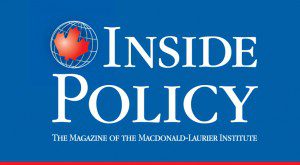 Americans notoriously pay little attention to Canada. But if they listen to the rhetoric of their leaders about NAFTA and the TPP, both of our nations will suffer.
Americans notoriously pay little attention to Canada. But if they listen to the rhetoric of their leaders about NAFTA and the TPP, both of our nations will suffer.
By Naomi Lakritz
A growing number of Americans, blissfully unaware that Canada has immigration laws, insist that they will pack up and move here if Donald Trump is elected president. A friend who works as a tour guide in Calgary met one of these Americans recently on his bus. When she told him that she is a Republican but would flee a Trump presidency, he suggested that she wouldn’t like it here because carrying guns is not permitted. Astonished at learning this, she demanded to know how Canadians protect themselves. “From what?” my friend asked.
Canadians have always fretted that the U.S. pays us too little attention unless Rob Ford is in the news, but the protectionist climate created by the current election is really something to worry about, for us and our American friends. We had best hope that Americans stop making travel plans and start to consider the extraordinary benefits that free trade has brought our two nations.
During the first candidates’ debate, Donald Trump, sniffing and snuffling as though frigid Canadian air was making his nose run, called the North American Free Trade Agreement the “worst” trade deal “ever.” He wants to scrap it. Hillary Clinton, who supported NAFTA when her husband’s administration brought it in, now says it needs to be “reassessed” and adjusted, whatever that means. Nor will she sign the Trans-Pacific Partnership, even though she supported it when she was a senator. I wonder if either of them has bothered to look at the statistics.
We had best hope that Americans stop making travel plans and start to consider the extraordinary benefits that free trade has brought our two nations.
According to the Office of the United States Trade Representative, US exports of goods to Canada last year amounted to $280 billion, up 179 percent over the pre-NAFTA era of 1993. That figure included $24 billion worth of agricultural products, with Canada being “our largest agricultural export market,” says the Trade Representative’s Office. And at $57.3 billion last year, US exports of services to Canada were up 237 percent from 1993.
In 2015, the US imported $295 billion worth of goods from Canada. That included $70 billion in mineral fuels, $55 billion worth of vehicles, and $20 billion worth of machinery. Agricultural imports totalled $22 billion last year, with Canada being the US’s largest supplier of snack foods, red meat, and fruits and vegetables. These figures represent a 165 percent increase from pre-NAFTA 1993.
Could somebody please explain what is so terrible about statistics like these? Mr. Trump? Mrs. Clinton?
Trump, in his typical style of patriotic pit bull, went on to accuse other countries of stealing American jobs as a result of free trade. And despite her more measured responses, it was clear that Clinton, too, had swallowed her protectionist pills with her coffee that morning.
However, the truth is that other countries did not steal American jobs. American companies chose to outsource their jobs and move their operations elsewhere, often to Third World countries, primarily because of cheaper labour costs. Canadian companies did the same. NAFTA is not responsible for your bank’s call centre relocating to Bangalore. With or without NAFTA, those jobs would have migrated to China and other countries, says Mauro Guillen, a political economist at the Wharton School, in a 2014 article entitled NAFTA 20 Years Later: Do the Benefits Outweigh the Costs?
The truth is that other countries did not steal American jobs
“We knew that low-wage manufacturing was going to move to Mexico from Canada and the U.S. And of course, part of this also moved to China and other locations …” Guillen says. “Perhaps NAFTA accelerated the process, but it did not make a huge difference. At the same time, a lot of jobs were created in the U.S. that wouldn’t be there without the Mexico trade … Many of the products made in Mexico are designed in the United States. So there are a lot of jobs created here.”
He adds that in 2013, the US’s trade deficit with Mexico was $54 billion, “but with China, it was $318 billion, so the [U.S.] deficit is five times bigger with China than with Mexico. In other words, you would calculate, maybe for every job we have lost in the US to Mexico, five [jobs] were lost to China.”
Canadian MP Wayne Easter, chair of the House of Commons finance committee, estimates that the loss of NAFTA would “impact thousands and thousands of jobs” in Canada and the US because of the supply chains NAFTA has created.
Trump’s and Clinton’s free-trade skepticism could have a receptive audience. The results of a Gallup poll last April revealed that 43 per cent of Americans surveyed, some of whom may hold a few of those “thousands and thousands of jobs”, said they didn’t know enough to offer an opinion on NAFTA and the TPP.
The truth hurts. But ignorance has far more painful consequences.
Naomi Lakritz is a Calgary journalist.




